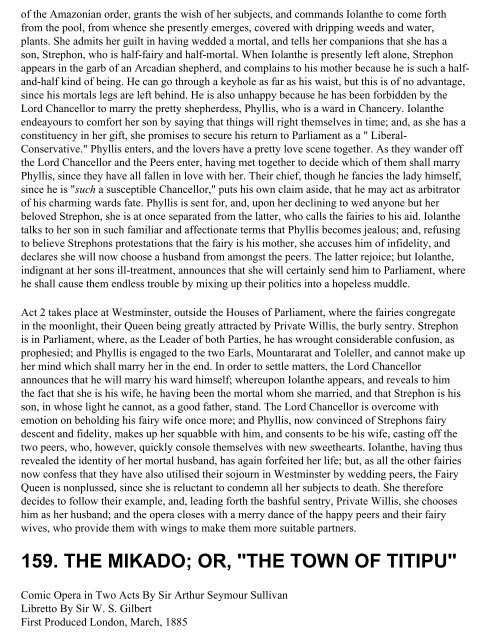Opera Plots I - MDC Faculty Home Pages
Opera Plots I - MDC Faculty Home Pages
Opera Plots I - MDC Faculty Home Pages
Create successful ePaper yourself
Turn your PDF publications into a flip-book with our unique Google optimized e-Paper software.
of the Amazonian order, grants the wish of her subjects, and commands Iolanthe to come forth<br />
from the pool, from whence she presently emerges, covered with dripping weeds and water,<br />
plants. She admits her guilt in having wedded a mortal, and tells her companions that she has a<br />
son, Strephon, who is half-fairy and half-mortal. When Iolanthe is presently left alone, Strephon<br />
appears in the garb of an Arcadian shepherd, and complains to his mother because he is such a halfand-half<br />
kind of being. He can go through a keyhole as far as his waist, but this is of no advantage,<br />
since his mortals legs are left behind. He is also unhappy because he has been forbidden by the<br />
Lord Chancellor to marry the pretty shepherdess, Phyllis, who is a ward in Chancery. Iolanthe<br />
endeayours to comfort her son by saying that things will right themselves in time; and, as she has a<br />
constituency in her gift, she promises to secure his return to Parliament as a " Liberal-<br />
Conservative." Phyllis enters, and the lovers have a pretty love scene together. As they wander off<br />
the Lord Chancellor and the Peers enter, having met together to decide which of them shall marry<br />
Phyllis, since they have all fallen in love with her. Their chief, though he fancies the lady himself,<br />
since he is "such a susceptible Chancellor," puts his own claim aside, that he may act as arbitrator<br />
of his charming wards fate. Phyllis is sent for, and, upon her declining to wed anyone but her<br />
beloved Strephon, she is at once separated from the latter, who calls the fairies to his aid. Iolanthe<br />
talks to her son in such familiar and affectionate terms that Phyllis becomes jealous; and, refusing<br />
to believe Strephons protestations that the fairy is his mother, she accuses him of infidelity, and<br />
declares she will now choose a husband from amongst the peers. The latter rejoice; but Iolanthe,<br />
indignant at her sons ill-treatment, announces that she will certainly send him to Parliament, where<br />
he shall cause them endless trouble by mixing up their politics into a hopeless muddle.<br />
Act 2 takes place at Westminster, outside the Houses of Parliament, where the fairies congregate<br />
in the moonlight, their Queen being greatly attracted by Private Willis, the burly sentry. Strephon<br />
is in Parliament, where, as the Leader of both Parties, he has wrought considerable confusion, as<br />
prophesied; and Phyllis is engaged to the two Earls, Mountararat and Toleller, and cannot make up<br />
her mind which shall marry her in the end. In order to settle matters, the Lord Chancellor<br />
announces that he will marry his ward himself; whereupon Iolanthe appears, and reveals to him<br />
the fact that she is his wife, he having been the mortal whom she married, and that Strephon is his<br />
son, in whose light he cannot, as a good father, stand. The Lord Chancellor is overcome with<br />
emotion on beholding his fairy wife once more; and Phyllis, now convinced of Strephons fairy<br />
descent and fidelity, makes up her squabble with him, and consents to be his wife, casting off the<br />
two peers, who, however, quickly console themselves with new sweethearts. Iolanthe, having thus<br />
revealed the identity of her mortal husband, has again forfeited her life; but, as all the other fairies<br />
now confess that they have also utilised their sojourn in Westminster by wedding peers, the Fairy<br />
Queen is nonplussed, since she is reluctant to condemn all her subjects to death. She therefore<br />
decides to follow their example, and, leading forth the bashful sentry, Private Willis, she chooses<br />
him as her husband; and the opera closes with a merry dance of the happy peers and their fairy<br />
wives, who provide them with wings to make them more suitable partners.<br />
159. THE MIKADO; OR, "THE TOWN OF TITIPU"<br />
Comic <strong>Opera</strong> in Two Acts By Sir Arthur Seymour Sullivan<br />
Libretto By Sir W. S. Gilbert<br />
First Produced London, March, 1885













